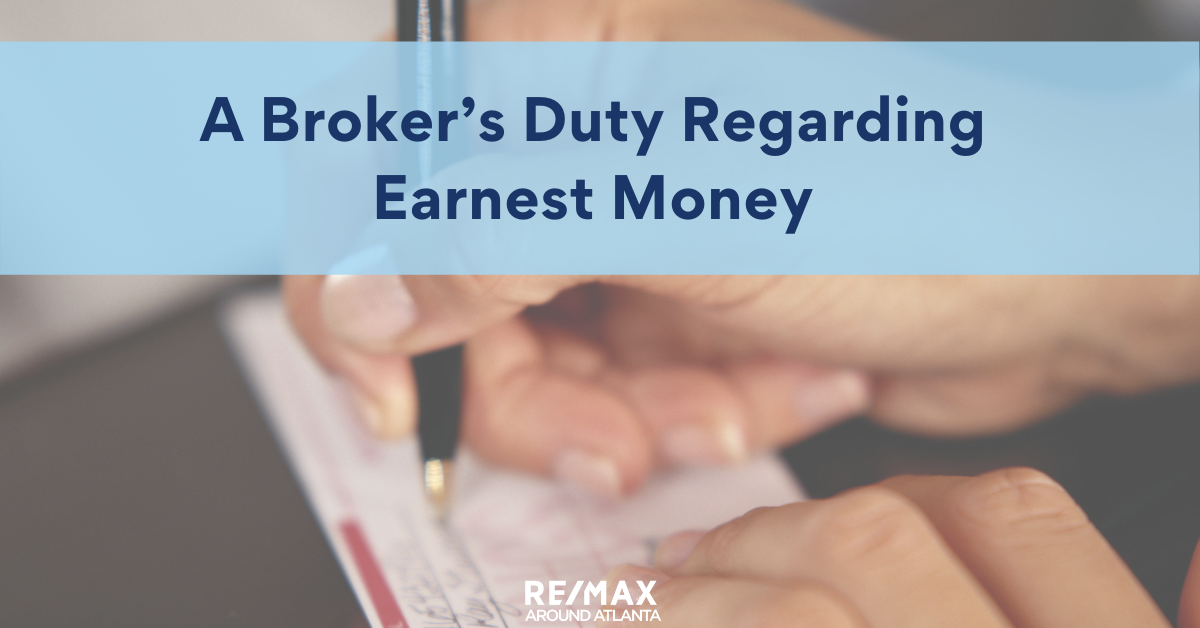


Earnest Money Defined
Earnest money is the buyer’s commitment of funds to indicate a serious desire to buy a property. It is customary, but it is not a legal requirement for a binding sales contract. The mutual promises to exchange valuable assets provide the legal consideration, if there is no earnest money. In this hot Seller’s market, an offer without earnest money may not even be considered.
The Holder and the Amount of Earnest Money
The amount of earnest money is a matter for negotiation between the parties and varies with the circumstances of the transaction and the relative negotiating power of the parties. If the buyer pays a small amount of earnest money and later decides not to buy, they may be more willing to forfeit the earnest money and walk away from the contract. On the other hand, a substantial earnest money deposit offers more protection against the possibility of a buyer’s breach.
The Holder of the earnest money is also up for negotiation. In the Atlanta market, the Buyer’s broker generally holds the earnest money. In other markets, like Savannah, it is the opposite. There is also a trend to the closing attorney holding the funds, as attorneys are generally seen as neutral third parties.
Disbursing Earnest Money
Disbursal of Earnest Money is governed by the terms of the Purchase Agreement. The Holder’s duty is to analyze the facts of each case and make disbursement decisions as a neutral referee, not prejudiced to either party. A broker who disburses earnest money from the firm’s trust account contrary to the terms of a contract will be considered by the Georgia Real Estate Commission to have demonstrated incompetency to act as a real estate broker in such manner as to safeguard the interest of the public. In such instances, the Commission may impose a strong sanction against the broker and its license.
Failure to Close
What if the Parties Cannot Agree to a Disbursement?
Issues arise when the parties do not agree to a proposed disbursement. The Georgia Association of Realtors (GAR) Purchase Agreement outlines a clear path for the Holder to follow.
1. Holder’s Reasonable Interpretation of the Purchase Agreement
The Holder can make a reasonable interpretation of the Purchase Agreement. The parties are informed of the Holder’s interpretation through a 10-day Notice, stating to whom and why the disbursement will be made. Parties may object by return 10-day Notice. The Holder may consider the objection and may confirm the original decision, send Notice of the Holder’s action and disburse. Or, the Holder may modify the original decision, and send a new 10-day Notice to both parties. If the Buyer’s funds are disbursed to the Seller, the funds constitute liquidated damages in full settlement of all claims of Seller against Buyer and the Brokers.
2.Interpleader
If the Holder cannot get the parties to agree and cannot make a reasonable decision based on the terms of the Purchase Agreement and the facts, an Interpleader Action can be filed and the funds are deposited with the appropriate court. The Court then makes the disbursement decision. An interpleader is costly and time consuming. It should be used as a last resort. The threat of an interpleader can spur an agreement between the parties.
3. Court Order
If parties claiming trust funds held by a broker litigate their claims, the broker must disburse the funds according to the order of the court. In this case, where the parties rather than the broker have initiated the court action, the funds would remain with the broker unless the broker is ordered to deposit the funds with the court while the litigation is pending.